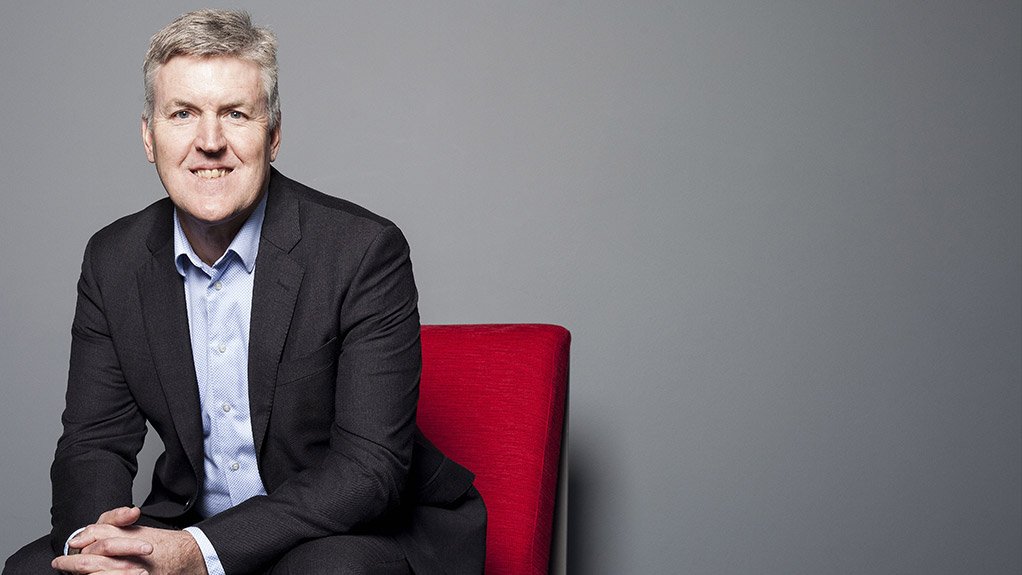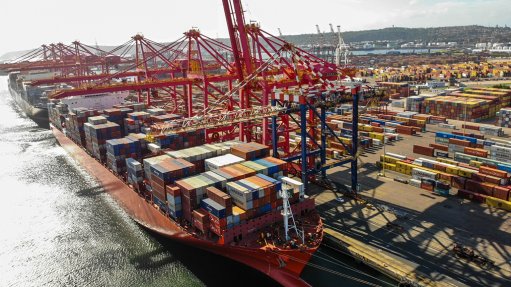EOH corruption study holds lessons for South Africa’s financial system


EOH CEO Stephen van Coller has led the company in its recovery following the corruption of 2017 and 2018
A study of the corruption that took place at JSE-listed information and communications technology company EOH from 2001 and its subsequent recovery from the damaging impact showed that there were multiple institutional failures across South Africa's financial ecosystem to detect and stem corrupt activities.
Other large, listed corporations, including Steinhoff and Tongaat Hulett, have also experienced corruption in recent years and corporate corruption has similarly damaging effects on an economy as State capture, especially on investor confidence.
The ‘Addressing Corporate Corruption in South Africa: The EOH Experience’ report, released this week, examined EOH as a case study of corporate corruption, said independent global affairs think tank ODI senior research associate and lead author Stephen Gelb.
There were many gaps and weaknesses in EOH relative to standard corporate practice in South Africa, and these illustrated the limitations of the voluntary standards approach to governance regulation at the JSE and more broadly in the South African corporate capital market, he emphasised.
"Remarkably, for a large publicly-listed company, there was no internal audit function within EOH and only a single compliance staffer. Many EOH subsidiaries did not produce full sets of accounts, their boards did not meet regularly, and there was limited oversight from the EOH board, which included questionable appointments such as an executive director who served from its 1998 listing to 2007, but was then appointed lead independent director until early 2019," he highlighted.
Capital market organisations, including banks, equity trading firms and market regulators, have a crucial role in helping to sustain corporate transparency through their analysis of corporate performance, the report emphasised.
"Further, the board of directors and external auditors are crucial linking agents between the corporation’s and its executive management’s accountability to key external stakeholders in the wider society, including shareholders, lenders, governmental authorities and the general public interest," it said.
EOH RECOVERY
Subsequent to the corruption becoming known, EOH completely re-composed its board of directors and replaced the auditors, as the two linking agents that facilitate accountability to key external stakeholders, Gelb said.
"The change in the auditors was a useful lever to legitimise changes to internal accounting practices, particularly around issues such as valuation of goodwill and intangible assets and treatment of accounts receivable," he added.
The new executive directors appointed under new CEO Stephen van Coller adopted a ‘proactive transparency’ approach to both customers and capital market stakeholders.
"EOH itself approached organisations with a regulatory or financial stake in its situation to offer cooperation and information, as part of negotiating deals over fines and sanctions, including the Zondo Commission, the National Treasury, the South African Revenue Services, the Special Investigating Unit, the State Information Technology Agency, the Financial Sector Conduct Authority, the Hawks and the Financial Intelligence Centre," highlighted Gelb.
"EOH also approached private sector regulatory agencies, which are capital market regulators including the JSE and the US Securities and Exchange Commission (SEC), which had been informed of the Microsoft-EOH deals by a whistle-blower. The company also approached the Independent Regulatory Board for Auditors (IRBA), the South African Institute for Chartered Accountants (SAICA), and the Institute of Directors (IOD).
"The new executive directors had extensive dealings with EOH’s suppliers, including global software companies, and financiers, including its consortium of bank lenders. EOH chief risk officer Fatima Newman estimated that she and Van Colller had engaged with almost 200 public sector entities," he said.
PROFESSIONAL BODIES' INACTION
In July 2020, the JSE fined EOH R5-million for publishing inaccurate financial accounts in 2017 and 2018. However, the new management was displeased, as not only had the misreporting happened before they took over, but it was the new management that informed the JSE of the problem and encouraged its investigation, Gelb highlighted.
"EOH’s current management noted that it is remarkable how little action there has been from either public or private regulators towards the individuals involved in corrupt activities, or those who, by omission, enabled them," he noted.
"The JSE, which is both market operator and market regulator, unlike the SEC in the US, fined EOH for inaccurate accounts in 2017 and 2018, but did not look at EOH more closely during those years, despite the concerns expressed publicly at the time about the company and the sudden drops in its share price," Gelb emphasised.
"Had the JSE done so, it would have found many problems with how EOH was meeting JSE-prescribed governance standards, including highly inadequate internal audit or compliance functions, faulty executive committee and board processes, and the lack of concern of independent directors regarding the rapid rise of EOH’s share price.
"It seems there has been no action taken against those inside or outside EOH involved in corruption at EOH from any of the 12 regulatory agencies with which the current management has engaged.
"This reflects a major problem with corporate regulation and oversight in the South African context," Gelb emphasised.
From the perspective of regulating remedial actions in corporations found to be corrupt, a more considered approach was needed in South Africa, he said.
"The EOH case study has emphasised the overly-permissive approach of the JSE and other regulatory bodies, which allowed the corporation to experience unlimited growth and become systemically important in the national ICT system, despite a questionable business model and a compliance approach enabling fraudulent behaviour.
"The JSE’s rather limp intervention towards EOH itself has, to date, been the only public action taken by capital market or other business regulators in relation to the EOH case," he noted.
In a system of voluntary self-regulation like corporate South Africa, there was no way to adequately assess corporate reporting beyond their audited financial accounts, he added.
The JSE itself does not scrutinise listed corporations, which might have picked up problems at EOH, or other corporate miscreants like Steinhoff.
The JSE also did not act to improve the performance, on governance and corruption issues at least, of stock analysts and business and financial journalists who, with a few notable exceptions, maintained an overly-optimistic view of EOH, well past the point when a much closer look was warranted, Gelb added.
"In the EOH case, there has been no action towards individuals involved by any of the several regulatory bodies, which the new management approached with detailed and relevant information.
No action was taken by the IRBA in terms of EOH's previous auditors despite the problems in the audited accounts. No action was taken by professional bodies SAICA or the CFO Society towards the external auditors or the financial directors inside EOH, and no action was taken by the IOD.
"There has also been no public action from the banks or banking regulators regarding bank officials across several banks who advanced a very large loan to the company in early 2017 without undertaking adequate due diligence, at a time when concerns about the corporation were beginning to emerge into the public domain.
"Additionally, no prosecutions have been instigated by the law enforcement authorities," Gelb highlighted.
EOH executives are unhappy about this lack of action by regulators towards individuals. It has been left to EOH itself to become a de facto leader in the corporate sector’s anti-corruption campaign in South Africa, including suing former executives, and engaging with policymakers and the wider public in large South African corporations and international public and private sector organisations.
CORPORATE OVERSIGHT RECONSIDERATION
"The EOH case should provoke South Africa’s business leadership to a careful reconsideration of limited corporate oversight in the economy, as they continue the fight against corruption," Gelb emphasised.
The standard approach to ending corruption is a ‘top-down’ strategy resting on the rule of law, and the detection and punishment of violations by effective enforcement agencies.
However, a top-down approach is necessary but not sufficient, because rules can be circumvented and the proceeds of corruption can be concealed, such as through falsified documents, the actions of outside collaborators, or fragmented approval processes.
"In these and other ways, it is possible to evade both internal and external scrutiny, allowing corruption to take place within the existing formal rules in some way. These corrupt activities involve not individuals acting alone, but rather informal groups of people inside the corporation acting in consort," said Gelb.
These groups have power within the corporation, and they necessarily include some people with formal authority, enabling the group to get hold of a stream of expenditure, revenue or finance, and to shape or evade the rules and escape scrutiny, he noted.
The ‘Addressing Corporate Corruption in South Africa: The EOH Experience’ report was an initiative of the National Business Initiative, Corruption Watch and ODI.
Comments
Press Office
Announcements
What's On
Subscribe to improve your user experience...
Option 1 (equivalent of R125 a month):
Receive a weekly copy of Creamer Media's Engineering News & Mining Weekly magazine
(print copy for those in South Africa and e-magazine for those outside of South Africa)
Receive daily email newsletters
Access to full search results
Access archive of magazine back copies
Access to Projects in Progress
Access to ONE Research Report of your choice in PDF format
Option 2 (equivalent of R375 a month):
All benefits from Option 1
PLUS
Access to Creamer Media's Research Channel Africa for ALL Research Reports, in PDF format, on various industrial and mining sectors
including Electricity; Water; Energy Transition; Hydrogen; Roads, Rail and Ports; Coal; Gold; Platinum; Battery Metals; etc.
Already a subscriber?
Forgotten your password?
Receive weekly copy of Creamer Media's Engineering News & Mining Weekly magazine (print copy for those in South Africa and e-magazine for those outside of South Africa)
➕
Recieve daily email newsletters
➕
Access to full search results
➕
Access archive of magazine back copies
➕
Access to Projects in Progress
➕
Access to ONE Research Report of your choice in PDF format
RESEARCH CHANNEL AFRICA
R4500 (equivalent of R375 a month)
SUBSCRIBEAll benefits from Option 1
➕
Access to Creamer Media's Research Channel Africa for ALL Research Reports on various industrial and mining sectors, in PDF format, including on:
Electricity
➕
Water
➕
Energy Transition
➕
Hydrogen
➕
Roads, Rail and Ports
➕
Coal
➕
Gold
➕
Platinum
➕
Battery Metals
➕
etc.
Receive all benefits from Option 1 or Option 2 delivered to numerous people at your company
➕
Multiple User names and Passwords for simultaneous log-ins
➕
Intranet integration access to all in your organisation


















